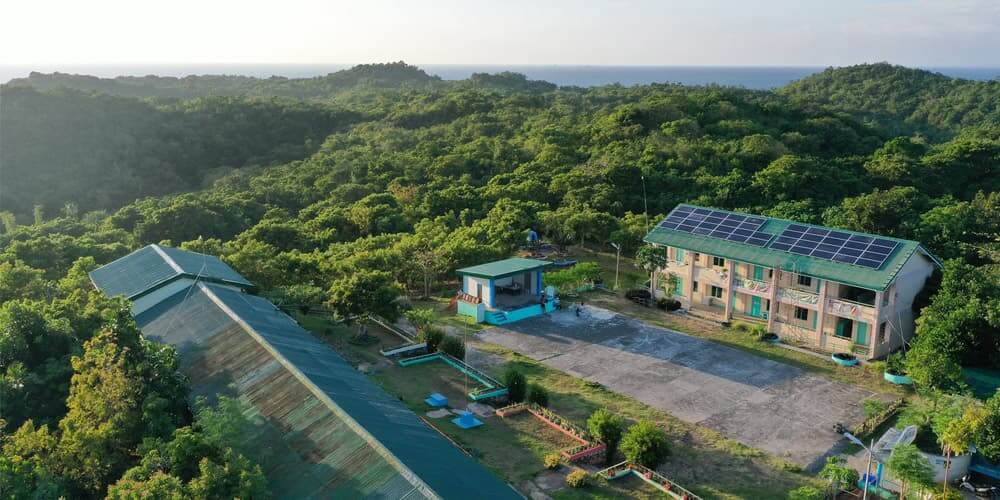CEBU, Philippines — European Union (EU) supported program Project Renewable Energy for Livelihood and Youth (RELY) has installed solar panels in two remote islands in Cebu.
The project team completed the installation of the solar power system with the help of school officials and community leaders amid COVID-19 related protocols.
“We look forward to the time when the students are able to come to school physically and experience how their learning conditions have improved. For now, the fully energized schools are helping teachers prepare the modules that their students need,” said RELY Project Director Sabine Schacknat, from lead implementor sequa gGmbH.
During the March 19 turnover of the solar energization projects at Carnaza Elementary School and at Carnaza National High School, located on an island off Daanbantayan in Cebu, Schacknat thanked the community for helping the project team amid quarantine restrictions. Under the project, Carnaza Elementary School is being powered by a PV system that has the capacity to generate 21,120 watts-peak (Wp) of electricity. The system includes 64 PV modules, inverters and batteries. Carnaza National High School, located on the other side of Carnaza Island, has an installation with a similar generation capacity.
According to EU Ambassador Luc Véron the approach of the project reflects the European Union’s policy which considers renewable energy as a critically important enabler that is central to our vision for a sustainable planet.
“Reducing greenhouse gas emissions and fighting climate change is a joint priority with the Philippines and this project contributes to it in a small but meaningful way,” said Vëron.
“We are thankful to Project RELY for helping DepEd achieve its long-term goal to improve public education in the country and provide equal opportunities to our learners in remote schools. With electricity from the sun, our learners will have classrooms that are conducive to learning and they will get to use electricity-powered learning tools. Having electricity will not only inspire our teachers, it will also make their jobs easier,” said DepEd 7 Regional Director Salustiano Jimenez.
In off-grid islands, teachers often have to go to the mainland to use computers and print teaching materials. Due to the absence of electricity, students have been unable to obtain lessons on the use of computers, which puts them behind their counterparts in urban areas.
RELY aims to promote use of renewable energy to improve lives and foster climate change mitigation in poor and remote communities by energizing 16 off-grid public schools in Cebu, Bohol and Palawan. The approach combines solar electrification with community development and improved vocational education by collaborating with five partner senior high schools located closest to the off-grid schools.
For Carnaza, the partner senior high school is Daanbantayan National High School which received from Project RELY a set of tools and equipment to upgrade the technical-vocational track for Electrical Installation and Maintenance (EIM) of Daanbantayan National High School. Since the donation was turned over in June 2019, Daanbantayan National High School EIM students have been able to acquire knowledge and skills related to solar technology.
Project RELY’s implementing partners are Vivant Foundation and PROCESS Bohol.
“The partnership with the senior high school is necessary to ensure the sustainability of the solar energization component. EIM (electrical installation and maintenance) students who are now getting instruction on solar technology will be the one conducting the maintenance of the solar installation at the off-grid school,” said Vivant Foundation Inc. Executive Director Shem Jose W. Garcia.
“This component of the project also aims to provide our youth opportunities in the future of energy,” added Garcia.
In November last year, Project RELY completed the energization through solar of six island schools in Bohol Province. The communities that host the schools have also been organized and capacitated through the community development.
PROCESS-Bohol has been organizing the communities of the 16 off-grid schools to help them identify and implement livelihood activities. “Livelihood development and the support for micro, small and medium enterprises in the off-grid communities are vital to the sustainability of any development project and are necessary for the endeavor to achieve collective impact,” said PROCESS-Bohol Executive Director Aurelio Salgados Jr.
The installation of solar panels for two other schools in northern Cebu will start shortly. Work on the solar energization of six schools in Palawan will begin once all four identified off-grid schools in Cebu have been energized through solar. Project RELY is one of the seven awardees under the EU-Access to Sustainable Energy Programme (ASEP). It received a P120-million (2.2 million Euros) funding from the EU, as well as additional financing from the Federal Government of Germany. ASEP is a joint project of the Department of Energy and the European Union that aims to assist the Government of the Philippines in expanding its sustainable energy generation to meet the growing needs of its economy and provide energy access to the poor and marginalized sector.
Read the original story here.
(Published in The Freeman March 27, 2021)

